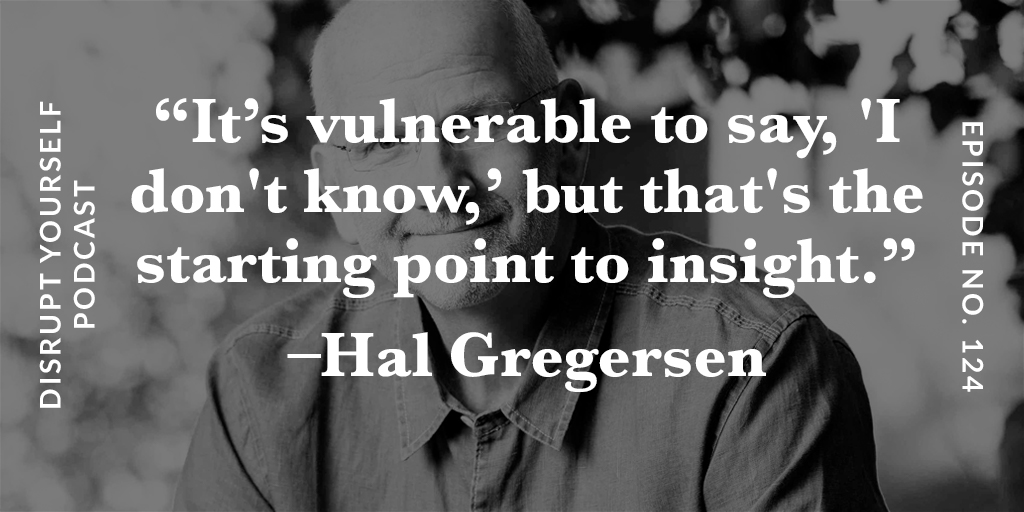Anyone who has been around a three or four-year-old child knows that they love to ask questions. These questions can be tedious to answer as an adult (What is that sound? Is it in airplane? Why do airplanes fly? Can humans fly? Why can’t you fly?) but every once in a while, the child will ask a question that makes you pause and really consider what they’re asking (Have you ever wanted to learn how to fly?).
“All of us…since the moment we were born, we were born to ask, we were born to inquire, we’re born to be curious… we all were questioners when we were young. And three or four year olds, we all know, ask tons of questions because they’re intensely curious about the world.”
At some point in our lives, questions become answers. We know why airplanes fly and humans can’t…or we’re at least good at pretending we know the answer. We’re trained from a young age that answers are more important; but more often than not, it is questions that will change a situation, and questions that will propel someone, or something, to action.

My guest today is Hal Gregersen, the executive director of the MIT Leadership Center and a senior lecturer in leadership and innovation at MIT Sloan School of Management. A Thinkers50 globally ranked management thinker, he has authored or coauthored ten books. His most recent book, Questions Are the Answer, examines the fact that while people are pre-programmed to look for answers, the real catalysts for innovative change are questions.
Hal has spent many years not only asking questions, but listening to them. There is a palpable energy in the room when you sit down to do a “question burst,” a method Hal recommends for rapidly tackling a problem. I hope that energy comes through as you listen to my own micro “question burst” on the podcast today. I certainly felt it!
Join us as we discuss Hal’s early careers in photography and politics; what makes a catalytic question; and the question that best motivates him to take action. Listen in the player above or download this episode on Apple Podcasts. What questions do you ask yourself? What is your “keystone” question? Do you have any questions for me? I would love to see them in the comments!
Takeaways from this episode:
- Early on in his life, Hal was convinced that he would go into politics. However, a brief moment of giddiness over someone else’s powerlessness had Hal asking himself, “What did you just do?” Being honest with himself and admitting that he was on the path toward abusing power was a wake-up call that he needed. He stepped away from politics and hasn’t looked back.
- In his book, Hal points out that “Questioning is an innate behavior that’s actively subverted and shut down.” The American education system rewards answers over questions, and many people become trained to only think within the box and lose their curiosity.
- Keystone questions are fundamental, guiding questions, almost like a North Star
- Catalytic questions challenge fundamental assumptions, but they also provide energy, an action orientation, and do something about the question.
- A Shadow question often comes from difficult experiences in our childhood
- Life is about projects, challenges, and engagement. “What are you trying to figure out? Let’s figure this out together. What do you need to know to do that?” In an open environment these kind of questions can bring a situation to its knees.
- If you’re “stuck” on a problem, try a “question burst.” (Think brainstorming session, but with nothing but questions.)
- Every sentence spoken must have a questions mark at the end.
- Try four minute segments of every speaking only in questions.
- You do not have to answer any of the questions
- Don’t explain anything; give no reasons why you’re asking the question, no background information.
- When Hal meets someone for the first time, his favorite question to ask them is “What is your story?” How they respond tells Hal a lot about who they are, whether they’re open or reserved, and how they approach the world.
- “[Q]uestions are not end points to a conversation; they’re starting points, they’re sparks, that’s what it’s all about … It’s, frankly, wondrous to watch strangers in a room, helping each other tackle their toughest challenges this way.”
- The right questions can create a psychologically safe place for inquiry. “[C]hoose your questions well. They create the path that you walk—choose those questions well.”
Links Mentioned in this Episode:
- Hal Gregersen – Website | Twitter | LinkedIn
- Questions Are the Answer: A Breakthrough Approach to Your Most Vexing Problems at Work and in Life by Hal Gregersen
- Build an A-Team: Play to Their Strengths and Lead Them Up the Learning Curve by Whitney Johnson
- Download a free chapter from Build an A-Team

